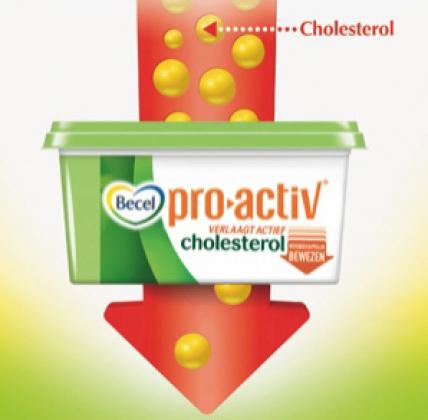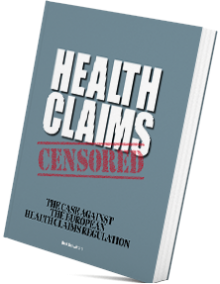On the first day of September, the Hanseatic Oberlandesgericht, situated in Hamburg, will publish its ruling in the case that was brought by FoodWatch against Unilever. FoodWatch contends that margarine containing cholesterol-lowering sterols must be classified as a medicinal product. On its (Dutch) website, the FoodWatchers state that Unilever’s Becel Pro-Activ® is a “cholesterol-lowering medicinal product” that has “the form of a food-product to which a highly concentrated active ingredient has been added.” FoodWatch also informs the readers of its website that the health benefits of the product “have not been proved.” Readers are invited to sign a petition entitled: “Do you agree that Becel Pro-Active® does not belong in the supermarket ?”
Since December 2012, when Regulation 432/2012/EC entered into force, food business operators who wish to use health claims concerning foods and foodstuffs brought on Europe’s internal market, may only do so when they make use of claims that have been authorized by the European Union. In 2006, when the Health Claims Regulation 1924/2006/EC was enacted, food business operators were unconditionally deprived of the freedom to use claims other than the ones etched in the stone called “European Regulation.” In 2006, all health claims used in commercial communication became public property. They are listed in a public Union Register. Since 2006, no individual food business operator any longer owns or has a special right in “private” health claims. The cholesterol-lowering claims aren’t Unilever’s. They are State-property and every food business operator may use them.
So, for one thing, FoodWatch is barking up the wrong tree. Its qualms are not caused by Unilever, but by the European Commission, to which the European legislature delegated the power to legalize health claims for, inter alia, the “highly concentrated active ingredients” called sterols and stanol-esters, such after consulting the Standing Committee on the Food Chain and Animal Health, in which representatives of all the Member States have a seat. The Commission and the Committee base their decisions on Opinions delivered by the European Food Safety Authority’s NDA Panel.
NDA’s panelists are meticulously screened to prevent that someone who would be tainted by no more than the shadow of a connection with “industry” will be admitted. The NDA Panel is a “public affair.” When it comes to the use of health claims in commercial communication, food business operators are far, cosmically far, removed from the evaluation and authorization process. The cholesterol lowering health claims used by Unilever are Union-authorized claims for sterols and stanol-esters. In the manufacturing of Becel Pro-Activ®, Unilever follows the conditions of use that accompany the claim.
In its zeal to brandish an important food business operator, FoodWatch conveniently overlooks the regulatory reality that Unilever must respect when it communicates to consumers the public message that use of its Becel Pro-Activ® has a cholesterol-lowering effect. Undeterred, FoodWatch invites consumers to support its petititon to remove Becel Pro-Activ® from the supermarket and place its distribution, sales and use under the supervision of pharmacists and medical doctors, implying that Unilever should apply for a marketing authorization to place Becel Pro-Activ® on the market as a medicinal product.
Commercially speaking, this might not be such a bad idea. Unilever should think about this suggestion. After all, cholesterol lowering “statins” are among the most profitable drugs of all times. And, they achieve precisely what Becel Pro-Activ® seems to accomplish. They “lower the risk for heart attack, certain types of heart surgery, and chest pain in patients who have a heart disease.” [i] That’s exactly what the European Union also tells us in Regulation 983/2009/EC, by way of which it authorized the health claim that “[p]lants sterols [and plant stanol-esters] have been shown to lower/reduce blood cholesterol. High cholesterol is a risk factor in the development of coronary heart disease.”
It is here that FoodWatch touches a nerve.
In its Official Journal of 26 July 2013, the European Union added another legislative pearl to the necklace strung around the necks of food business operators. In Regulation 718/2013, the European Commission determined that manufacturers of certain food products must inform consumers of the fact that these products are not intended for people who don’t need them. In the Union, consumers who are not in need of certain products are now warned not to buy the products they don’t need by way of a mandatory warning placed on the products they don’t need that says that these products are not intended for people who don’t need them.
In 2004, in its Regulation 608/2004, the Commission had determined that manufacturers of food products that can help lower blood cholesterol levels – because the products contain sterols or stanols – should place a positively formulated mandatory statement on the label claiming that these products are intended exclusively for people who want to lower their blood cholesterol level. This was a kind of Commission-authorized health claim avant la lettre. In view of the more recent officially authorized cholesterol-lowering health claims, the European bureaucracy concluded that this mandatory statement must now be replaced by a negatively formulated mandatory statement that says that these products are not intended for people who do not need to “control their blood cholesterol level.”
According to the Commission, the combination of the old mandatory claim that these products are intended for people who want to lower their blood cholesterol level and the current Union-authorized health claims that these products have been shown to lower/reduce blood cholesterol and contribute to the maintenance of normal blood cholesterol levels, could potentially lead consumers who do not need to control their cholesterol levels to purchasing them. To reduce the risk of such mishaps, the lower-your-cholesterol health claim must now be accompanied by a disclaimer stating that the claim must be neglected when you don’t need to lower your cholesterol.
So, we now have very informative labels bearing the voluntary health claim that informs consumers about a product’s cholesterol lowering and normalizing effects in combination with the mandatory statement that such products are not intended for people who don’t need to control their blood cholesterol level.
In the past decades, all of us have been incessantly and overwhelmingly bombarded by intense and very serious public health campaigns instructing us to take dietary measures to actively reduce the risk of developing coronary heart disease by controlling our cholesterol level. Jumping on this bandwagon, Unilever created the BeCeL® trademark, which is the acronym for Blood Cholesterol Lowering. Doctors and dietitians have unanimously and incessantly brainwashed us to remove eggs, butter, cheese and other cholesterol-rich foods from our diets. Controlling cholesterol “across the board” was a matter of public health and no consumer was to be left behind. We were all at risk and those of us who ignored the message were regarded as risk-takers who were irresponsibly gambling with their health.
Open the
European Commission’s website, and the opening sentence still tells you that “[i]n Europe today, 6 of the 7 biggest risk factors for premature death – blood pressure, cholesterol, Body Mass Index, inadequate fruit and vegetable intake, physical inactivity and alcohol abuse – relate to how we eat, drink and move.”
But, when it comes to controlling the labels of products that lower one of the biggest risk factors for premature death, not all of us seem to be at risk. Now that we finally have State-authorized health claims that manufacturers of cholesterol-controlling food products may use to inform consumers that, according to EFSA, the European Commission and the Standing Committee, sterol/stanol spreads and margarines will lower and help maintain normal cholesterol levels and will therefore significantly reduce the risk of developing coronary heart disease, the Union instructs these manufacturers to accompany these health claims by a disclaimer that says that these products are not intended for people who do not need to control this ubiquitious risk factor.
Who are these bionic consumers who do not need to control their blood cholesterol level ? You ? Me ? How does anyone know whether he/she belongs to this mysterious and undefined group ? Who must protect him-/herself against the risk of potentially purchasing a product he/she doesn’t need ? How do you figure out that all the stanols and sterols you have been dutifully consuming during all those years have not been in vain because you didn’t need them ? When these products, according to one Union-authorized health claim [ii], also “contribute to the maintenance of normal blood cholesterol levels,” who then belongs to the group of people who don’t need to control blood cholesterol ? Haven’t we been and aren’t we still taught that we, i.e. all of us, must take great care to control our blood cholesterol levels ? To avoid premature death …..
Unimportant as this cholesterolimbroglio may seem in the broader context of public health and the “hectics” of daily life, it sheds light on the fact that when government bureaucrats take control of things, we inevitably get a mushrooming complexity that might well fit the Wonderland where Alice could have said: “Come and see, my little consumers. I have something wonderful for you. It tastes just as good as eggs in the morning. You should eat it every day and, I promise you, it brings you healthy hearts and kisses. It will also save your life. But beware, little consumers, I haste to say, it’s not for those of you who don’t need it. And what’s so very funny, although I assure you that all of you need it, I’m not going to tell you which ones of you don’t need it !”
Bert Schwitters
[i] Public information provided by Pfizer for Lipitor®.
[ii] Regulation (EU) No 432/2012.




